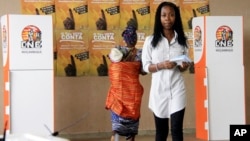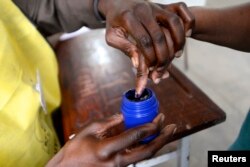Mozambique marks its 5th democratic presidential election on October 15, passing another milestone on its quest to shed its war-scarred past. The vote represents a coming-of-age for a key demographic: Mozambicans born after the brutal 16-year civil war. At the nation’s oldest and largest university some young voters, full of opinions, expressed difficulty identifying with their older leaders.
There is little sign on the campus of the country's largest university that there is a major national election. The visual assault of red election posters, plastered on every public surface in Maputo by the ruling party, Frelimo, seems to magically stop at the university gate.
The absence of political ads does not define the new demographic: a generation of Mozambican voters who - unlike their leaders - have no memory of this nation’s defining independence struggle and civil war.
Millions born after the war ended in 1992 will be voting for the first time. More than 65 percent of Mozambique’s 24-million-strong population is younger than 25 -- and each year, more and more of them become eligible to vote (at the age of 18).
As VOA visited the campus of Eduardo Mondlane University ahead of this week’s vote, dozens of young people were talking about politics.
This generation seems widely exasperated by their elders’ insistence on using the war as a talking point. Some expressed frustration with the ruling party’s alleged corruption and nepotism, and on persistent inequalities between the cities and countryside. Many others complained that the nation’s education system is slipping.
Every single person we spoke to said they planned to vote.
Biology major Leonor Goncalves, 20, rebuked her elders who beat the war drums as part of their campaign. That is a not-so-subtle jab at the main opposition party, Renamo, which was the main rebel group during the civil war -- and which in 2013 launched a spate of violent attacks over tensions with the long-time ruling Frelimo party.
Some parties, she recalled, in their campaign, always talk about war in their speeches. For example, some say, “we will attack, we will fight, we will kill” if things don’t go their way.
"We have to move on, we need peace," she said.
Other students, like 19-year-old public administration major Jossais Jordao Janiero, noted the nation’s future rulers need to focus on education -- and to consider quality, not just quantity. “They talk more about building schools, about building this, but they don’t talk about giving quality to our education. So for me, the most important issue in this election, for the next government, is to work more for the education,” stated Janiero.
Fresh ideas
Crime prevention student Sitoe Francisco Carlos, 32, has two children of his own, and jokes that he feels old on campus.
"The environment is inspiring... Young people have new ideas to improve our society. Of course the old people... I’m talking people with 50 years and more, I believe that they have, you know, outdated ideas, because they still think about wars and other things, while we need to improve our society in terms of transportation, employment, better schools, this is what the young people vote for,” he said.
Sociology student Belmira Leticia Mondane, who is 19 and voting for the first time, said she also wants a better educational system.
If she were president, standing up a little straighter at the thought -- she would change things, and rectify longstanding inequalities, she said.
"I would try to build more public universities, streets and hospitals," she said. "But I won’t do it in the city. I’ll do it in the countryside. In the city, we have it."
Mozambique’s youthquake is unlikely to upend the status quo. After all, some voters said, Frelimo has been in power for as long as they can remember. And Renamo has been on the sidelines for that long.
But this young generation is pushing new words into the debate -- words like “change,” and “more,” and “better,” and “now.” And as they do this, their numbers are growing.





